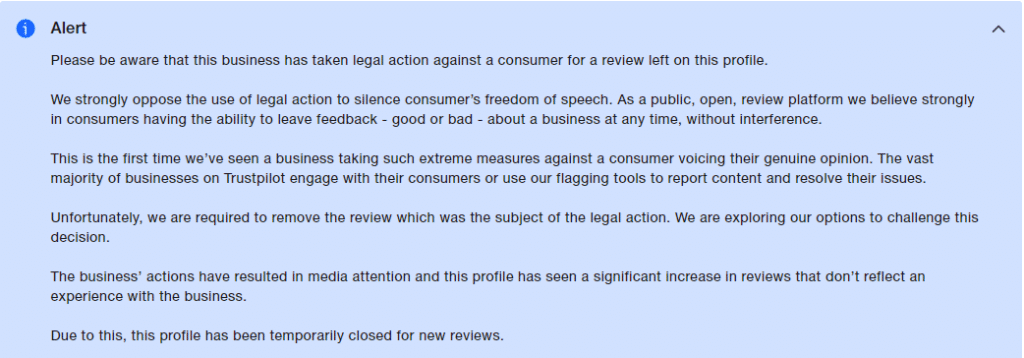Are reviews freedom of speech or do businesses have a right to protect their reputation?
Last week we reported on the Summerfield Browne v Waymouth case where the court ruled that a Trustpilot review was libellous resulting in a £25,000 damages payment and an order that Trustpilot removes this review.
There are 2 points of contention to this ruling, firstly at what point does opinion become libellous and secondly, how can a judge make a ruling against Trustpilot when they weren’t party to the proceedings?
Summerfield Browne page gets ‘review bombed’
To throw another spanner into the works, the Summerfield Browne Trustpilot page has had to be temporarily disabled as disgruntled members of the public have taken to ‘review bombing’ the page – the digital age phenomenon where non-customers write negative reviews in order to bring down the company rating.
A prominent notice at the top of the Summerfield Browne page from Trustpilot states that ‘the business’ actions have resulted in media attention and this profile has seen a significant increase in reviews that don’t reflect an experience with the business.”
Trustpilot vows to ‘strongly oppose’ ruling
Trustpilot have stated that they have yet to be served the notice that requires the post to be removed but if that were to come to fruition they would challenge the order as they ‘strongly oppose the use of legal action to silence consumer’s freedom of speech.‘
Further to this, they state that this is the first time they’ve seen a business react to a review with ‘such extreme measures’ and that they would explore options on how to challenge the decision.
The statement by Trustpilot heavily implies that Waymouth was simply using his freedom of speech and that it was genuine feedback however this clearly goes against the ruling made by Master David Cook which condemned the language used after Summerfield Browne was called “another scam solicitor“.

Was Waymouth simply providing his opinion or did he have malicious intent towards Summerfield Browne?
Legally speaking, there is no doubt that Waymouth made the statement as a matter of fact that implied that Summerfield Brown WAS a ‘scam solicitor’. However, that may not be how the average person would interpret the statement. Many would say that the review was merely a quirk of the English language and that Waymouth was simply expressing himself however the fact that it could be interpreted as fact is what landed him in hot water.
This ‘freedom of speech’ has probably caused the loss of business to Summerfield Browne and the court duly ruled that this was defamation. To call a business a ‘scam’ is a strong allegation indeed and from the perspective of a business, it shouldn’t be allowed to continue as it will harm their reputation. To protect yourself from claims such as this one, a reviewer should always clearly frame their feedback as an opinion instead of a fact unless it can be easily proven.
For what was a £200 letter, so much grief could easily have been avoided by Waymouth by simply voicing that he didn’t feel that Summerfield Browne was good value for money instead of defaming them with such a harsh statement.
Likewise from an outsiders perspective, could the action was taken by Summerfield Browne be deemed disproportionate or worthy of their time? Almost definitely. Yes, they successfully won large damages but in the grander scheme of life, this could actually be more damaging to their business. The reviewing bombing of their Trustpilot page by members of the public who deemed their actions heavy-handed could cause irreversible damage to their reputation, far more than a petty 1-star review ever could.
Bigger issues are afoot
Reputation damages to Summerfield Browne and a large payment for Waymouth could end up be a small footnote in the implications this case could bring to any website providing a review or comment feature. The fact that Trustpilot was not a party to the proceedings makes the ruling against them complicated, to say the least.
No order has currently been served but if and when that happens a digital Pandora’s Box could be opened that could forever change the way the internet is used. The argument that will likely be used is that Trustpilot is a platform and not a publisher. Much in the way you cannot sue a paper factory for something printed by a tabloid you shouldn’t be able to sue a website for the comments by one of its users.
Indeed a similar issue has crept up recently with the abuse of footballers and other celebrities by social media users. Indeed the Secretary of State for Digital, Culture, Media and Sport, Oliver Dowden, has promised action on the matter. Nobody can doubt the seriousness of such comments but can social media companies be held responsible for every libellous review or racist comment when their users number in the billions?
The Secretary of State promised to ‘make social media companies more accountable’. Whether this is hyperbole to encourage the likes of Facebook, Twitter and indeed Trustpilot to engage in the issue remains to be seen but it is a threat that should not be taken lightly. A more likely resolution is that social media companies will compromise voluntarily and implement new measures, for example, to identify anonymous users (either by name or by IP address).
We are going to change the law to make social media companies more accountable for what happens on their platforms & they can start showing their duty of care to players today by weeding out racist abuse now
— Oliver Dowden (@OliverDowden) February 8, 2021
Players must not be abused for doing their jobs, enough is enough
2/2
Should Trustpilot or any other website lose such a case the greater implication could be that the fabric of the internet could change. By Waymouth contending that his statement was simply freedom of speech, that very same freedom could be curtailed if websites owners decide that any government ruling is too onerous.
Therefore any supporter of the freedoms of the internet should strongly back Trustpilot to stand their ground lest we end up in a place we had no intention of going.

Do you have a technology, dispute resolution or corporate matter that you’d like to discuss with the team? Alston Asquith have offices in London and Hertfordshire and can arrange a call to provide some initial advice.
We pride ourselves on our relationship with our clients as well as the service we provide. View some of our feedback on Trustpilot.
Visit our contact page to find out how we can help.
Read more
Defamation on Social Media and Online: A Complete Guide
Defamation
The great ‘work from home’ debate: government guidance to remain until June but should flexibility remain afterwards?
